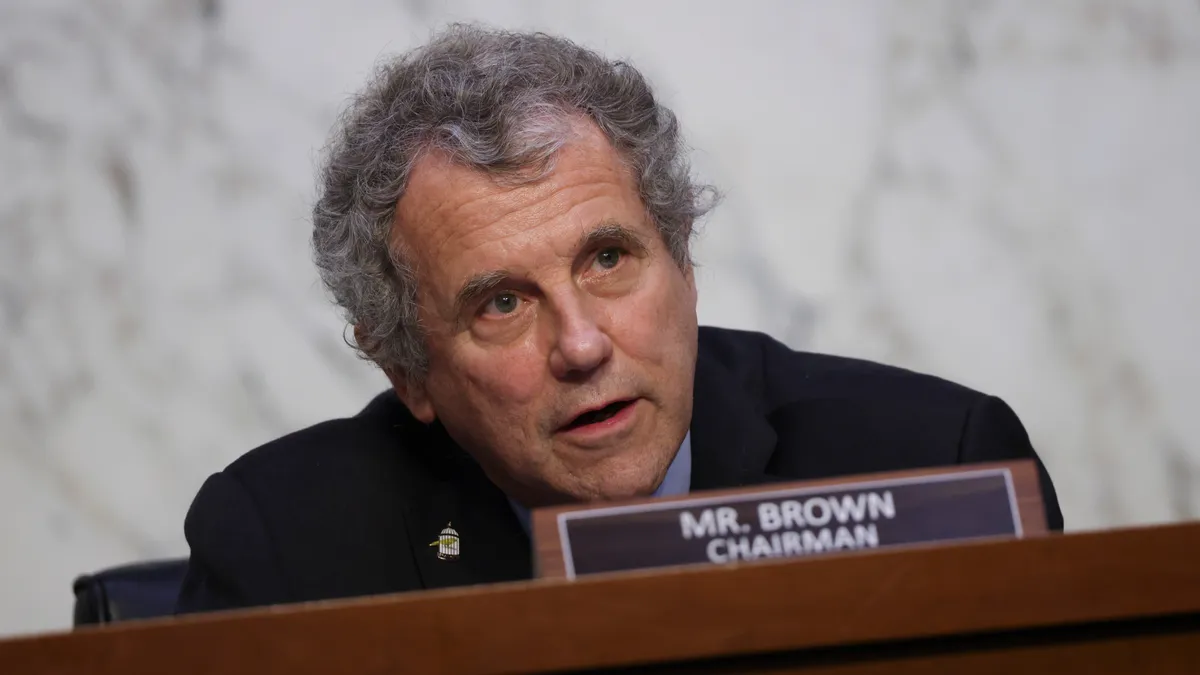As the nation gears up for one of the most contentious elections in recent memory Tuesday, a number of scenarios could reshape the Senate Banking Committee.
The headliner of the day was always going to be the White House race between Republican former President Donald Trump and Democratic Vice President Kamala Harris. But 34 Senate seats are up for grabs.
Republicans hold 49 of the Senate’s 100 seats. Democrats, meanwhile, can claim 47, but four other senators who are independent – Kyrsten Sinema of Arizona, Joe Manchin of West Virginia, Bernie Sanders of Vermont and Angus King of Maine – either were elected as Democrats or caucus with them, giving the party the thinnest of majorities as to committee leadership.
Two of those independent seats, Sinema’s and Manchin’s, are up for a vote Tuesday – with Republican West Virginia Gov. Jim Justice ahead in polls to take the seat occupied by Manchin, who is retiring.
That alone could set up a chain of events potentially flipping the power structure in arguably the most influential government panel on banking if Trump were to win the White House.
But a deeper look at whose seats are most vulnerable reveals a potential for power struggle.
Namely, Senate Banking Committee Chair Sherrod Brown, D-OH, finds himself -- perhaps unexpectedly – in a fight for his political life. Democratic power brokers’ donations propelled Cleveland car dealer magnate Bernie Moreno to a primary victory in March (on the thought that Moreno would be the weakest Republican opponent for Brown). But the strategy arguably backfired, as Ohio’s conservative voters have rallied around Moreno.
If Brown wins and Democrats keep the Senate
Chairmanship at Senate Banking maintains its status quo.
If Brown loses and Republicans take the Senate
The Senate Banking Committee’s ranking member, Sen. Tim Scott, R-SC, would be poised to take the gavel. Scott has been a vocal opponent of the Federal Reserve-led effort to revamp capital requirements for banks. He led a push by 39 Republican senators last year, asking regulators to withdraw the initial Basel III proposal. (It was rewritten but not officially withdrawn, and – crucially – regulators appear divided on it.)
Scott has also served as a vocal skeptic of Democratic choices for agency leadership. He called, early on, for the resignation of Federal Deposit Insurance Corp. Chair Martin Gruenberg, in the face of damning allegations of rampant sexual harassment at the agency. Beyond that, Scott criticized Democrats’ leading choice to replace Gruenberg, Commissioner Christy Goldsmith Romero of the Commodity Futures Trading Commission, saying she lacked experience with bank supervision or prudential policymaking.
If Brown loses, Republicans take the Senate and Trump wins
Trump may offer Scott a Cabinet post. That possibility opens up a potential scrum for leadership of the panel – with several viable candidates, including Republican Sens. Thom Tillis of North Carolina, John Kennedy of Louisiana and Cynthia Lummis of Wyoming (that choice may portend a particular willingness to work on a path forward for crypto). Mike Crapo of Idaho, a former Senate Banking chair, would also continue on the panel but would become chair of the Senate Finance Committee if Republicans flip the chamber.
If Brown loses and Democrats keep the Senate
This scenario could represent Republicans’ least favorite option because it opens the Senate Banking Committee gavel to Sen. Elizabeth Warren, D-MA – although she wouldn’t be first in line. The longest-serving Democrat on the panel, after Brown, is Sen. Jon Tester of Montana. But he, too, is facing a difficult re-election.
If Tester is voted out, Sen. Jack Reed, D-RI, would be next in line. But Reed is largely expected to remain the top Democrat on the Senate Armed Services Committee. Sen. Mark Warner, D-VA, would be next, by tenure, followed by Warren.
Three other possibilities
Alongside Brown, Tester is in perhaps the most vulnerable spot, facing tough odds against Republican Tim Sheehy in his deep-red home state.
A ripple effect from a Trump victory would leave one committee seat open as Sen. J.D. Vance, R-OH, would become vice president.
A second ripple – regardless of who takes the White House, is what happens to outgoing Sen. Laphonza Butler’s committee seat. The California Democrat is not running for a full term, and the race to succeed her is likely, in her deep-blue state, to go to Rep. Adam Schiff. Schiff has proved an outspoken crypto advocate among his party – but also led 20 House Democrats last year in asking the Justice Department, the Securities and Exchange Commission and the FDIC to look into Goldman Sachs’ dual role as both an adviser to Silicon Valley Bank (ahead of its failure) and the buyer of a securities portfolio from the bank.
Tuesday’s election also represents a battle for majority in the House. Republicans hold 220 of the 435 seats in the chamber. Democrats count 212, and three are vacant. The House Financial Services Committee will change chairmanship regardless because the panel’s leader, Rep. Patrick McHenry, R-NC, is not running. Several lawmakers could vie for leadership of the panel if Republicans keep their majority in the House, though the committee’s vice chair, Rep. French Hill, R-AR, may represent the early inside track. If Democrats flip the House, it is assumed the panel’s ranking member (and former chair), Rep. Maxine Waters, D-CA, would hold control.






















